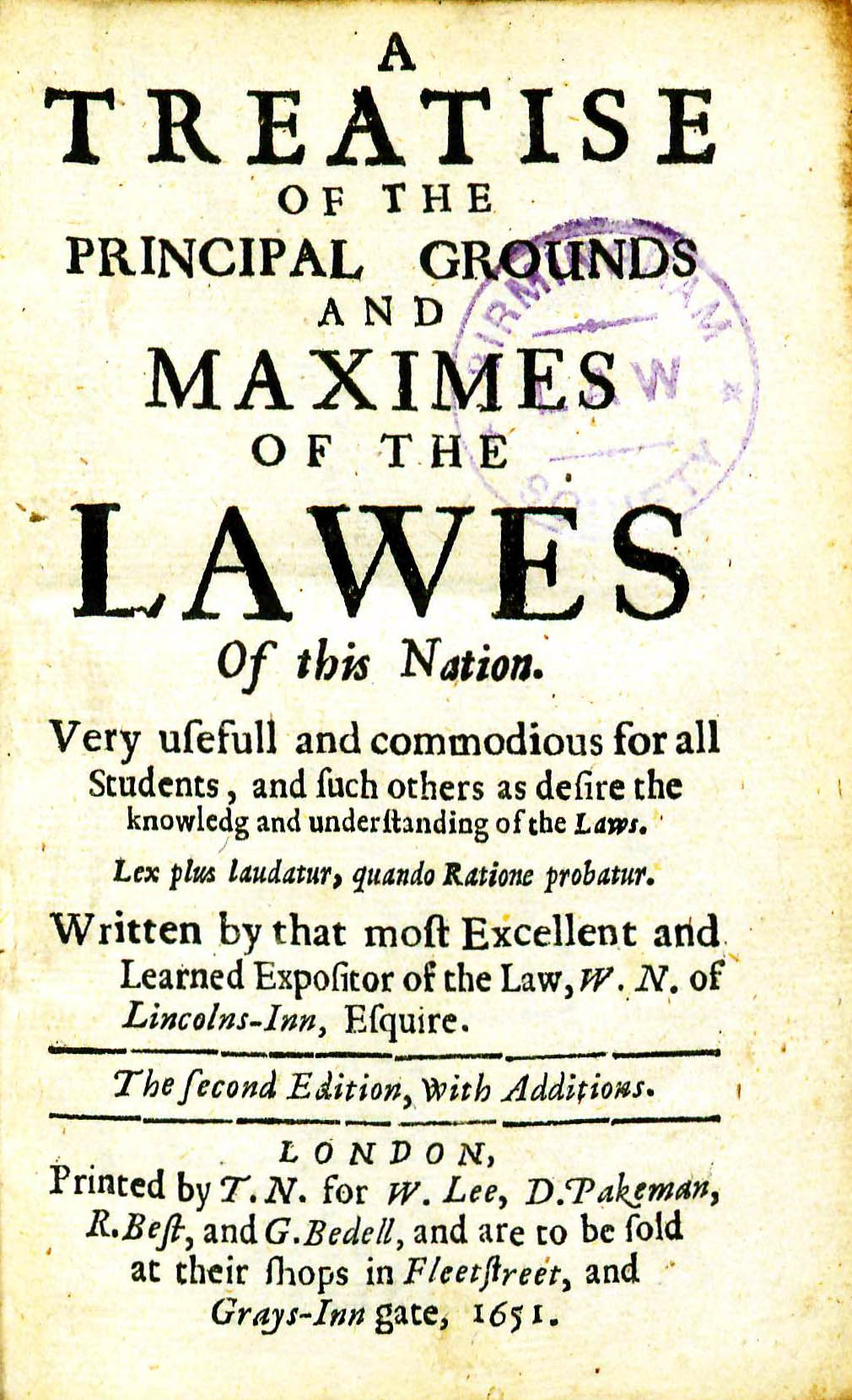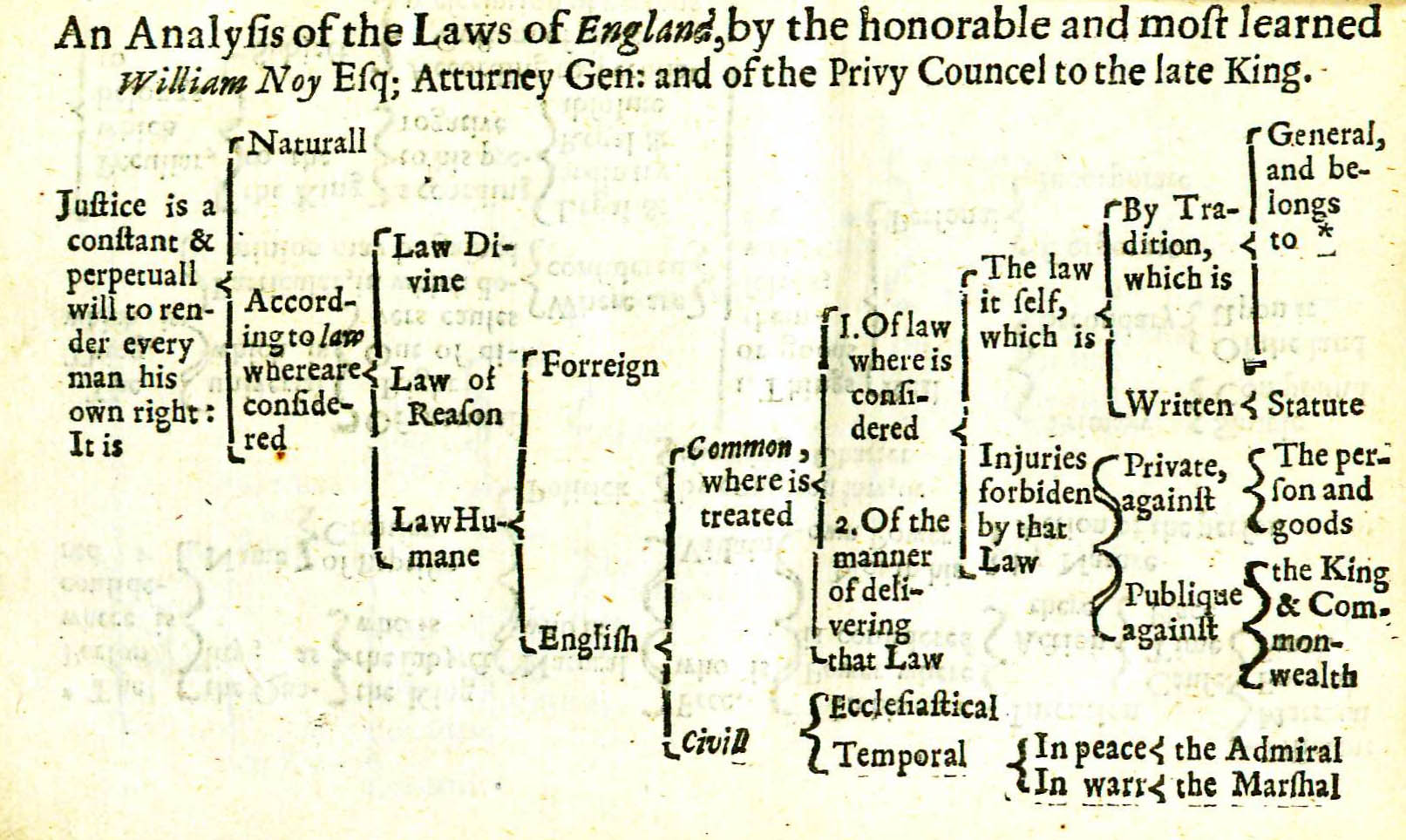Difference between revisions of "Treatise of the Principal Grounds and Maximes of the Lawes"
From Wythepedia: The George Wythe Encyclopedia
m (Lktesar moved page Treatise of The Principal Grounds and Maximes of the Lawes to Treatise of the Principal Grounds and Maximes of the Lawes without leaving a redirect) |
|||
| Line 1: | Line 1: | ||
| − | {{DISPLAYTITLE:''A Treatise | + | {{DISPLAYTITLE:''A Treatise of The Principal Grounds and Maximes of the Lawes''}} |
===by William Noy=== | ===by William Noy=== | ||
__NOTOC__ | __NOTOC__ | ||
| + | [[File:NoyTreatisePrincipalGroundsMaximesLawes1651TitlePage.jpg|right|thumb|200px|Title Page from [https://catalog.swem.wm.edu/law/Record/2094080 ''A Treatise of the Principal Grounds and Maximes of the Lawes''], George Wythe Collection, Wolf Law Library, College of William & Mary]] | ||
<blockquote> Noy's fame and reputation have traditionally rested on his work as a so-called ‘opposition’ MP in the parliaments in the 1620s, or on his subsequent tenure as attorney-general or, more particularly perhaps, on the seeming political volte face which made the second career possible after the first. Along with his colleague Thomas Wentworth he became a symbol of Stuart political opportunism. Contemporary chroniclers denounced him as a turncoat who had abandoned his principles and his political bedfellows in order to advance his own professional career... These characterizations, while containing some truth, are generally unfair because they fail adequately to reflect either Noy's genuine professionalism, or the complex and often contrary demands placed on a career politician in the early modern world. He had had a long and distinguished career and was held in high esteem as both an MP and a lawyer. If his subsequent work as attorney-general created enduring political controversy, his legal decisions always reflected an honest and intelligent reading of contemporary law. The scope of his learning was beyond dispute. He wrote or compiled a number of thoughtful and important works on the law, including ''A Treatise on the Rights of the Crown'' (1634), ''A Treatise of the Principall Grounds and Maximes of the Lawes of this Kingdom'' (1641), ''The Compleat Lawyer'' (1651), and at least one volume of contemporary law reports, all of which were published some time after his death, despite the political odium presumably associated with his name. Perhaps his greatest legacy was the learning he passed on to the subsequent generation of lawyers. Among his pupils were Sir Orlando Bridgman, Sir John Maynard, and most notably, Sir Matthew Hale. <ref> James S. Hart Jr, ‘Noy , William (1577–1634)’, Oxford Dictionary of National Biography, Oxford University Press, 2004; online edn, May 2009 [http://www.oxforddnb.com/view/article/20384, accessed 7 June 2013] </ref> </blockquote> | <blockquote> Noy's fame and reputation have traditionally rested on his work as a so-called ‘opposition’ MP in the parliaments in the 1620s, or on his subsequent tenure as attorney-general or, more particularly perhaps, on the seeming political volte face which made the second career possible after the first. Along with his colleague Thomas Wentworth he became a symbol of Stuart political opportunism. Contemporary chroniclers denounced him as a turncoat who had abandoned his principles and his political bedfellows in order to advance his own professional career... These characterizations, while containing some truth, are generally unfair because they fail adequately to reflect either Noy's genuine professionalism, or the complex and often contrary demands placed on a career politician in the early modern world. He had had a long and distinguished career and was held in high esteem as both an MP and a lawyer. If his subsequent work as attorney-general created enduring political controversy, his legal decisions always reflected an honest and intelligent reading of contemporary law. The scope of his learning was beyond dispute. He wrote or compiled a number of thoughtful and important works on the law, including ''A Treatise on the Rights of the Crown'' (1634), ''A Treatise of the Principall Grounds and Maximes of the Lawes of this Kingdom'' (1641), ''The Compleat Lawyer'' (1651), and at least one volume of contemporary law reports, all of which were published some time after his death, despite the political odium presumably associated with his name. Perhaps his greatest legacy was the learning he passed on to the subsequent generation of lawyers. Among his pupils were Sir Orlando Bridgman, Sir John Maynard, and most notably, Sir Matthew Hale. <ref> James S. Hart Jr, ‘Noy , William (1577–1634)’, Oxford Dictionary of National Biography, Oxford University Press, 2004; online edn, May 2009 [http://www.oxforddnb.com/view/article/20384, accessed 7 June 2013] </ref> </blockquote> | ||
| Line 7: | Line 8: | ||
'''Author:''' William Noy, (1577-1634) | '''Author:''' William Noy, (1577-1634) | ||
| − | '''Title:''' A Treatise Of The Principal Grounds And Maximes Of The Lawes Of This Nation: Very Usefull And Commodious For All Students And Such Others As Desire The Knowledge And Understandings Of The Laws | + | '''Title:''' ''A Treatise Of The Principal Grounds And Maximes Of The Lawes Of This Nation: Very Usefull And Commodious For All Students And Such Others As Desire The Knowledge And Understandings Of The Laws''. |
'''Published:''' London: by T.N. for W. Lee, D. Pakeman, R. Best, and G. Bedell, 1651. | '''Published:''' London: by T.N. for W. Lee, D. Pakeman, R. Best, and G. Bedell, 1651. | ||
| Line 14: | Line 15: | ||
==Evidence for Inclusion in Wythe's Library== | ==Evidence for Inclusion in Wythe's Library== | ||
| + | [[File:NoyTreatisePrincipalGroundsMaximesLawes1651Chart.jpg|left|thumb|200px|<center>An Analysis of the Laws of England.</center>]] | ||
==Description of the Wolf Law Library's copy== | ==Description of the Wolf Law Library's copy== | ||
| + | View this book in [https://catalog.swem.wm.edu/law/Record/2094080 William & Mary's online catalog.] | ||
===References=== | ===References=== | ||
<references/> | <references/> | ||
| − | [[Category: | + | [[Category:Legal Treatises]] |
[[Category:Titles in Wythe's Library]] | [[Category:Titles in Wythe's Library]] | ||
Revision as of 17:06, 1 August 2013
by William Noy

Title Page from A Treatise of the Principal Grounds and Maximes of the Lawes, George Wythe Collection, Wolf Law Library, College of William & Mary
Noy's fame and reputation have traditionally rested on his work as a so-called ‘opposition’ MP in the parliaments in the 1620s, or on his subsequent tenure as attorney-general or, more particularly perhaps, on the seeming political volte face which made the second career possible after the first. Along with his colleague Thomas Wentworth he became a symbol of Stuart political opportunism. Contemporary chroniclers denounced him as a turncoat who had abandoned his principles and his political bedfellows in order to advance his own professional career... These characterizations, while containing some truth, are generally unfair because they fail adequately to reflect either Noy's genuine professionalism, or the complex and often contrary demands placed on a career politician in the early modern world. He had had a long and distinguished career and was held in high esteem as both an MP and a lawyer. If his subsequent work as attorney-general created enduring political controversy, his legal decisions always reflected an honest and intelligent reading of contemporary law. The scope of his learning was beyond dispute. He wrote or compiled a number of thoughtful and important works on the law, including A Treatise on the Rights of the Crown (1634), A Treatise of the Principall Grounds and Maximes of the Lawes of this Kingdom (1641), The Compleat Lawyer (1651), and at least one volume of contemporary law reports, all of which were published some time after his death, despite the political odium presumably associated with his name. Perhaps his greatest legacy was the learning he passed on to the subsequent generation of lawyers. Among his pupils were Sir Orlando Bridgman, Sir John Maynard, and most notably, Sir Matthew Hale. [1]
Bibliographic Information
Author: William Noy, (1577-1634)
Title: A Treatise Of The Principal Grounds And Maximes Of The Lawes Of This Nation: Very Usefull And Commodious For All Students And Such Others As Desire The Knowledge And Understandings Of The Laws.
Published: London: by T.N. for W. Lee, D. Pakeman, R. Best, and G. Bedell, 1651.
Edition:
Evidence for Inclusion in Wythe's Library
Description of the Wolf Law Library's copy
View this book in William & Mary's online catalog.
References
- ↑ James S. Hart Jr, ‘Noy , William (1577–1634)’, Oxford Dictionary of National Biography, Oxford University Press, 2004; online edn, May 2009 accessed 7 June 2013
